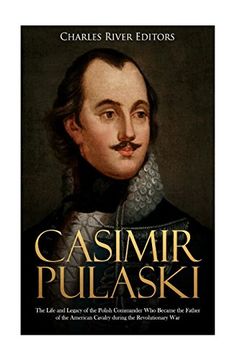Casimir Pulaski: The Life and Legacy of the Polish Commander who Became the Father of the American Cavalry During the Revolutionary war (en Inglés)
Reseña del libro "Casimir Pulaski: The Life and Legacy of the Polish Commander who Became the Father of the American Cavalry During the Revolutionary war (en Inglés)"
*Includes pictures *Includes contemporary accounts *Includes online resources and a bibliography for further reading "I came here, where freedom is being defended, to serve it, and to live or die for it." - Pulaski Many Americans labor under the misconception that the nation’s colonial and national heritage was almost wholly accomplished by an English migration, and the notion of early American diversity ends at an acknowledgment of the slave trade conducted between Southern buyers, Northern shippers, the African continent and the Caribbean region. However, early America witnessed the development of New York by the Dutch, the southernmost regions by Spain, and what would become eastern Canada by the French after lengthy battles with Britain. In fact, the Seven Years’ War during the 1750s was fought on a nearly global scale between several European belligerents. As a result, when the Revolution began, the Continental Army sported numerous volunteers from Ireland, Scotland, virtually every European nation between France and Russia, and men from the northern and southern borders of the European continent. There are good reasons America doesn’t possess a constitutionally-confirmed national language, despite an English-speaking majority; among the early proposals for such a common language, German and French served as contenders, with the latter going on to become Western Europe’s official diplomatic language. Likewise, those who accomplished the legislative, diplomatic, and military miracles that helped 13 separate colonies hold off the greatest power in the world represented a multi-national heritage. With European nations unceasingly at war, soldiers from one side or the other often found themselves in disfavor, were marked men in exile, or were fleeing from a superior force. To General George Washington’s good fortune, a few found their way to the colonies to join in the cause. Some were adventurers recently cut off from their own borders, while others embraced the American urge for freedom that so closely mirrored the same movements in their home countries. Nations such as France undoubtedly had an elevating effect on America’s capacity to make formal war, and Lafayette is the most famous foreigner to serve in the Continental Army, but one of the most important individuals who arrived at Washington’s door was Polish aristocrat Kazimierz Michal Wladyslaw Wiktor Pulaski, known to future generations as the “Father of the American Cavalry.” Few foreign participants in early American events are as widely decorated in non-military society as this Polish cavalry officer driven into exile from his own nation’s fight for independence. Pulaski considered the American urge for resistance against Britain to be an inseparable principle from Poland’s lengthy struggle against Russian domination. Today, streets, bridges, monuments, and even neighborhoods bear Pulaski’s name across the country, and in Polish communities, he is often hailed as a hero equal to General Washington himself. Historians speculate that without Pulaski having taken specific actions in one or more crucial battles, the war against Britain might well have taken a far different and darker turn. At the very least, it was Pulaski who made America’s Congress and military leadership aware of the importance of cavalry units and a need for establishing the first “true legion” of warriors on horseback to act in support of the foot soldiers. A man of ferocious resolve despite a diminutive stature, Pulaski was the first to lead the unit bearing his name as a Brigadier General under Washington. Casimir Pulaski: The Life and Legacy of the Polish Commander Who Became the Father of the American Cavalry during the Revolutionary War profiles one of the Revolutionary War’s most important figures. Along with pictures of important people, places, and events, you will learn about Pulaski like never before.

